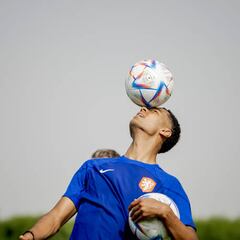“The ceremony will surprise people, Qatar have been courageous”
Marco Balich, executive producer of the opening ceremony of the Qatar World Cup, sat down with AS for an interview.

On the eve of the Qatar World Cup 2022, Marco Balich, executive producer of the opening ceremony at the Al Bayt Stadium, spoke to AS in an interview in which he discussed the show he helped to create. He talked about the vision of Qatar, the surprises in store for the millions of viewers, and how he looked to tell the story of a nation presenting itself to the world. Oh, and a massive whale shark suspended in the air.
You can follow the Opening Ceremony live with Reem.
- What’s different about this ceremony?
Well, it’s the first time there is actually a ceremony and not a pre match show, typically there was either a gala like in South Africa, a few days before, remember? Or, there was a kind of artist, singer with some choreography around and then the match started. This time they really wanted to have a proper ceremony so they called us because we do ceremonies, which is not having an artist - there are artists, there is the guy from BTS, you know, the Korean man, which has been announced - but overall it’s a ceremony where the supreme committee wanted really to give their own take on why they organised the Fifa football championship.
- Is it a complicated ceremony?
In a way, they’re promoting themselves as a platform between the western world and Asia, to be a platform of values: peace, respect and inclusivity is the code, the values that they want to promote. The point is that there’s been a lot of criticism, as you are probably very aware, but in reality the value of sport is what will allow this country to propose itself - and it will be scrutinised. And they will be under the magnifying glass of everyone so whatever has been the criticism in the past they are promoting themselves, they will say we want to be open we want to be pursuing those values of sports and retaining our own Qatari identity but still being welcoming to everybody, every religion, gender etc.
- How do you express the culture of a country like Qatar?
A: I think we have to acknowledge the criticism, Qatar has to acknowledge the criticism. I am just doing the ceremony, a very humble part, but I believe that when we received the brief form the Supreme Committee, let’s be truthful, let’s address and celebrate the values of sport and values of Qatar and promote them: this is not an artist performing a song, this is a ceremony where values are presented; Qatar is represented by a woman and there will be very big surprises of the image that they offer and I think it is very interesting to see.
But I must say that, compared to the region, say, they have been really courageous, in a way, because [people] will enquire in every way, the media will ask and look around so they are exposing themselves and they are willing to expose themselves. You have to put in the context of where we are in the world, they have to retain their identity, they don’t say ‘we will forget our identity’, they are who they are, but they are willing to stretch themselves and welcome everyone, gender wise, religion wise, attitude wise… it will be really interesting to see how the ceremony translates this and I hope you will enjoy it.
- Did they have any requirements?
They also wanted to have a proper 30 minute ceremony so, because it was 30 mins, we couldn’t fit it before the match, we had to do it before the warm-up, it will start at 17:45 local time, finish at 18:10, then the warm-up for half hour, 15 mins of going to the dressing room, flags, Qatar-Ecuador at 19:00, in Europe it will be 15:00 in the afternoon, but it’s Sunday, it will be raining so…
- How long have you been preparing the ceremony?
This has been a one year journey. We assembled a super team to work around this. Now we are 900 people. Also in the ceremony we are doing a big whale shark suspended in the air, which I will have to show you, and then show for the fan zone, on water, very complicated.
- So it’s not only the ceremony…
Three elements; they understood we had a good team creatively. The ceremony, for me, as an olympic producer and creative director, it’s very difficult [shows a photo of the whale shark], it’s suspended 40 metres in the air, it’s very cool, it’s a beautiful picture, I hope it becomes the icon. Coming back to the ceremony, it will be 30 minutes but it has obviously a lot of limitations because of the field of play, we are the nightmare of the groundsmen, they give us very strict rules, you cannot have more than 120 people on the pitch at any one time, otherwise the grass… and so everything we have was to fly things and, you will see.
- Do you work closely with the artists on the show?
No, in ceremonies it’s different. In the half-time of the Super Bowl, everything is the artist with choreography around. Here, you do a narrative and then like a piece of a puzzle, you insert the famous talent, artists, musical artists, dancers: they fit the narrative you want to propose and not vice-versa.
- How many times have you worked with ceremonies?
A: This is my 17th ceremony, between the Olympics and Paralympics… my first was Torino 2006 Winter Olympics. I did the inauguration of the Juventus and Shakhtar stadiums and I hope I am able to do the same for the new Bernabéu.
- In Spain we have a very good memory of the 1992 Olympics.
Of course, Barcelona, it was fantastic! Fantastic! As a matter of fact, when I won the bid to do 2006, I hired the executive producer as my associate of Barcelona - which was this Australian guy… I remember the archery, it was Spain blossoming out to the world. Are you from Barcelona?
- I am from San Sebastián.
Nice food in San Sebastián.
- How many companies fight for a ceremony like this?
We are four. Typically there is an American company, an English company, us and an Australian company, but we manage to really, because we work in a different way from the Anglo Saxons… we try not to be identified as Italians, we try to be as cosmopolitan as we can… we have a creative director from Qatar who did all the soundtrack and the musical components, very good guy. And we have Angela Law who did fantastic things in Saudi National Day: cosmopolitan talents all around, that is our peculiarity, we don’t come as a pyramid of one nation… that the lesson of the olympics, when you do a ceremony, your attitude is not ‘I come and impose my view’, I come, I listen, I absorb and then I celebrate what you are telling me we need to celebrate.
- Which tournaments have you done before?
I did Torino 2006 Olympics, Sochi Olympics, then Rio 2016, I did the bi-centenary in Mexico, Pan-American games in Peru.
- What gets more audience: a World Cup or Olympic ceremony?
The opening ceremony of the Olympics, typically, is the biggest show in the world from an audience and cast perspective because 10,000 extras… remember Barcelona, all those people! Also, because it’s the most expensive show in the world. FIFA is starting to think that they need a ceremony but typically what they say as data - the opening ceremony of summer Olympics is 2.8b, without Africa because there is no data of the audience.
The 2nd biggest is the Final of FIFA, the final match, with the difference of 1.8b - that’s what they say. My understanding is that the Olympics is family, FIFA is more male friends, this is the difference. So the philosophy of how to stage a show is the same: it has to be comprehensible by everyone, regardless of language, and understood by a 14 year-old child from a remote village in Tanzania. If you are understood by that, it is going to be watched by a lot of people, a lot. And most of all, now, with social media, it will be seen like a summary, like you see on YouTube. It will be seen by Madonna, The Pope, The Emperor of Japan, but also by people in all the world - you have to acknowledge you are talking to the world so you need to promote Qatar and the values that they represent. That’s why we were very intrigued because of that; they didn’t say ‘go with the pearl diving’ - they are really focussing on how to project the image of Qatar.
- Are you going to do the final ceremony as well?
We are doing the closing ceremony but that will be less, I don’t want to say less but at the final, everyone wants to see the match.
- Do you have a budget for the ceremonies?
Yes, they give you the amount of money you have to perform within that and if you go over, it’s your fault. This is the thing. But they believe in the ceremony and there will be a sufficient budget to do a very interesting thing. My personal wish is to see that there is a difference between a ceremony and a half-time Super Bowl, which is the typical building up and building down in 20 minutes; that revolves around an artist and this revolves around a context which I’m very keen to get.
Related stories
- Can you tell us any surprises?
There will be a woman representing Qatar, which is very new for them. The music has been composed by a Qatari orchestra and musician, the creative director is this lady called Angela Law who did shows in Saudi Arabia and this man [I can’t hear his name], so it’s a team effort. We have some stages on the field of play and we had to hire a specific sort of production designer to build the stages that don’t, they are super light but with very big wheels to not kill the grass. I think that even though there will be some elements of Qatari folklore, the language is completely contemporary and very sleek. And then there will be a big surprise in the final at the last moment… Well, two things: one is a very emotional movement from Qatar where they’re going to legitimise themselves why they did this, and there is a tribute. It’s going to be a surprise, but it is a very interesting surprise, a very interesting take on that, you will see. And then there will be a big finale with pyrotechnics, the Al Bayt stadium.


